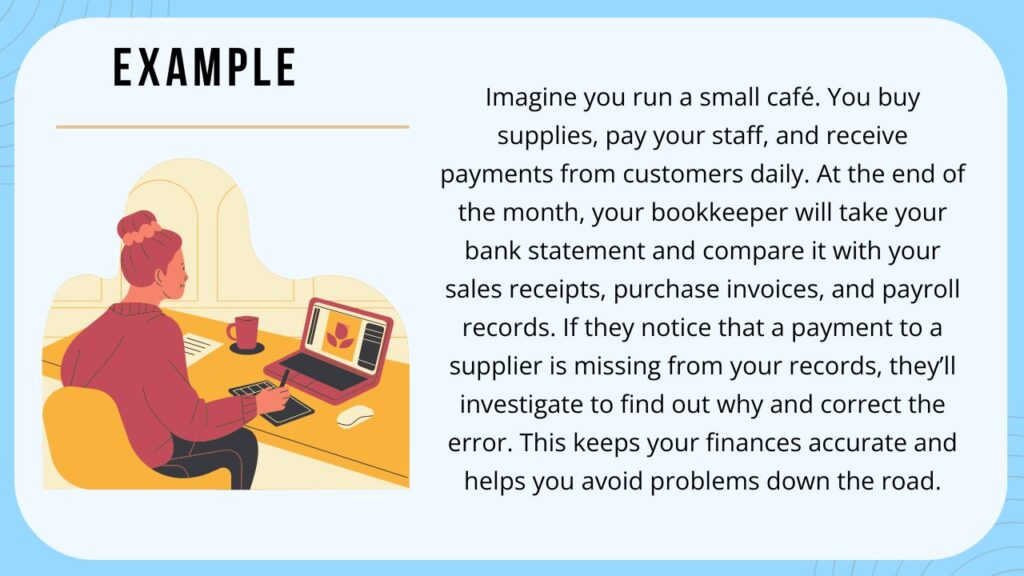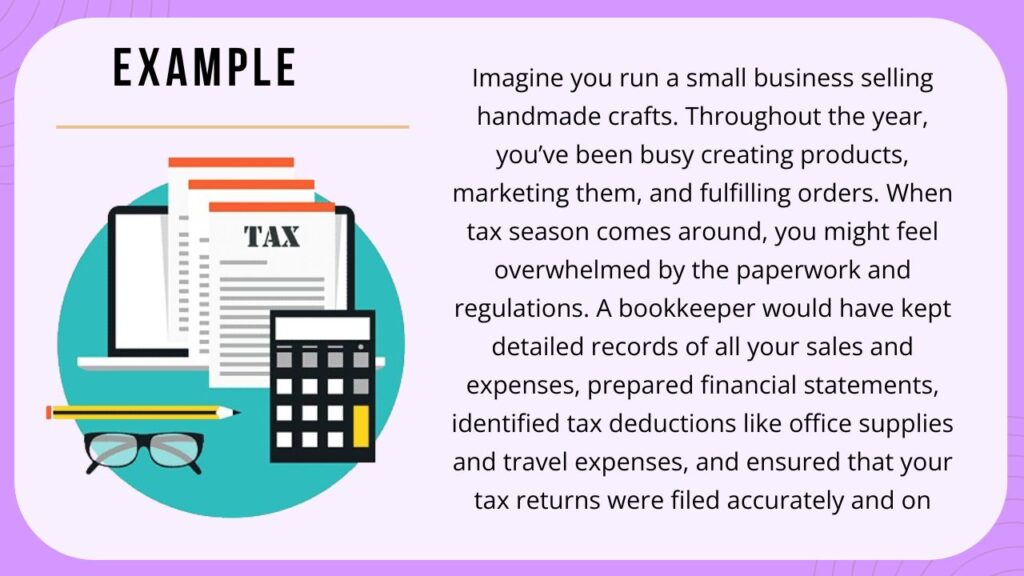Have you ever wondered what exactly a bookkeeper does in today’s fast-paced business world? If you’re running a business, you might already know that keeping your finances in check is crucial. But what role does a bookkeeper play in this process? In this article, we’ll explore the essential tasks of a bookkeeper and how they contribute to the success of modern businesses.
Bookkeepers might seem like behind-the-scenes players, but their work is vital. They handle everything from recording daily transactions to preparing financial reports. Understanding the role of a bookkeeper can help you see why they are indispensable in any business, big or small.
So, let’s dive into bookkeeping and see how these financial wizards keep businesses running smoothly. This guide will give you a clear picture of what bookkeepers do and why their role is so important.
Daily Transaction Recording
One of the primary responsibilities of a bookkeeper is to keep a detailed record of every financial transaction that occurs within a business. These transactions include sales, purchases, receipts, and payments.
Sales: Every time your business sells a product or service, the bookkeeper records the transaction. This includes the date of sale, the amount received, and any relevant details about the customer and the product or service sold.
Purchases: Similarly, whenever your business buys supplies, equipment, or any other goods and services, the bookkeeper records these expenses. This ensures that you have a clear record of where your money is going and helps in tracking inventory and costs.
Receipts: Bookkeepers also record all incoming payments, whether they come from customers, loans, or other sources. This helps in keeping track of the business’s income and ensuring that all expected payments are received.
Payments: Finally, bookkeepers keep track of all outgoing payments. This includes paying suppliers, settling debts, and handling any other expenses the business incurs. This meticulous recording helps in managing cash flow and ensuring that the business always has enough funds to operate smoothly.
Think of bookkeepers as the meticulous note-takers of the business world, ensuring every penny is accounted for. Their attention to detail ensures that the financial records are accurate and up-to-date, providing a solid foundation for all financial reporting and decision-making within the business. Without bookkeepers, it would be challenging to keep track of all the daily financial activities, leading to potential financial mismanagement and chaos.
Managing Accounts Payable and Receivable
Managing accounts payable and receivable is one of the most important tasks a bookkeeper handles. But what does that really mean? Let’s break it down in simple terms.

Accounts Payable refers to the money your business owes to others. This could be payments for supplies, rent, utilities, or any other bills. Accounts Receivable, on the other hand, is the money that others owe to your business. This includes payments from customers for products or services you’ve provided.
Why Is This Important?
Imagine you run a small bakery. Every month, you need to pay for ingredients, rent for your shop, and utilities like electricity and water. These payments are your accounts payable. At the same time, you sell cakes, cookies, and bread to your customers, who pay you either immediately or within a certain period. These sales are your accounts receivable.
If you don’t keep track of who you owe money to and who owes money to you, things can get messy. You might forget to pay a bill, leading to late fees or a disruption in your services. Or you might miss out on collecting payments from customers, which means less money for your business.
How Does the Bookkeeper Help?
A bookkeeper keeps detailed records of all your accounts payable and receivable. They make sure that:
- Bills Are Paid on Time: They keep track of due dates and make sure payments are made promptly to avoid late fees and maintain good relationships with suppliers.
- Payments Are Collected: They follow up on invoices and ensure customers pay on time, keeping your cash flow steady.
Let’s say your bakery received a big order from a local restaurant that needs 100 cakes for an event. You send them an invoice for the order, which is your accounts receivable. Your bookkeeper will track this invoice, remind the restaurant to pay if needed and record the payment when it comes in. Meanwhile, you need to pay your flour supplier by the end of the month. Your bookkeeper will ensure this bill is paid on time, keeping your business running smoothly.
Reconciling Bank Statements
One of the key responsibilities of a bookkeeper is reconciling bank statements. But what does that mean exactly? Let’s break it down.
What is Bank Reconciliation?
Bank reconciliation is the process of comparing the company’s financial records with its bank statements to make sure they match. This might sound straightforward, but it’s a critical task that helps keep a business’s finances accurate and up-to-date.
Why Is It Important?
Think of it this way: If you only looked at your bank statement without checking it against your own records, you might miss errors or even potential fraud. The same goes for businesses. By regularly reconciling bank statements, bookkeepers can spot discrepancies early. This process ensures that all financial transactions are accurately recorded.
Breaking Down the Process
- Gather Records: The bookkeeper collects all financial records, including receipts, invoices, and bank statements for the period being reconciled.
- Compare Entries: They go through the bank statement and compare each transaction with the company’s records. This includes checking deposits, withdrawals, and any fees.
- Identify Discrepancies: If there’s a transaction on the bank statement that doesn’t match the company’s records, the bookkeeper investigates further. This could be due to a recording error, a missed transaction, or even fraud.
- Adjust Records: Once discrepancies are identified, the bookkeeper makes the necessary adjustments to the company’s records to ensure they match the bank statement.
- Verify and Repeat: This process is repeated regularly, usually monthly, to keep the financial records up to date and accurate.

Preparing Financial Reports by the Bookkeeper
One of the most important tasks a bookkeeper performs is preparing financial reports. These reports are essential for understanding the financial health of a business. Let’s break down the main types of financial statements bookkeepers compile and why they are so crucial.
Balance Sheet
The balance sheet provides a snapshot of a company’s financial position at a specific point in time. It lists all the assets, liabilities, and equity of the business.
- Assets include things like cash, inventory, and equipment.
- Liabilities are the debts and obligations the company owes, such as loans and accounts payable.
- Equity represents the owner’s interest in the business, which is the difference between assets and liabilities.
By looking at the balance sheet, business owners and managers can quickly see what the company owns and owes, giving them a clear picture of its financial stability.
Income Statement
The income statement, also known as the profit and loss statement, shows the company’s financial performance over a specific period, such as a month, quarter, or year.
- Revenues include all the money earned from sales and other income sources.
- Expenses are the costs incurred to generate those revenues, like salaries, rent, and utilities.
The income statement helps business owners understand if they are making a profit or a loss. It provides insights into how well the business is doing and highlights areas where costs can be controlled.
Cash Flow Statement
The cash flow statement tracks the flow of cash in and out of the business over a specific period. It is divided into three main sections:
- Operating Activities: Cash generated or used in the core business operations, like sales and expenses.
- Investing Activities: Cash used for or generated from investments in assets, such as buying or selling equipment.
- Financing Activities: Cash received from or paid to investors and creditors, including loans and equity financing.
Understanding cash flow is critical because even profitable businesses can fail if they run out of cash. The cash flow statement helps ensure that the business has enough cash to meet its obligations.
Why These Reports Matter
These financial reports give business owners and managers a comprehensive view of the company’s financial health. They can see how much money the business is making, where it is being spent, and what resources are available. This information is vital for making informed decisions about budgeting, investing, and strategic planning.
Questions for the Reader
- Have you ever reviewed your business’s balance sheet? What did you find most useful about it?
- Do you feel confident in interpreting your income statement and making decisions based on it?
- How often do you review your cash flow statement to ensure your business has enough liquidity?
Payroll Processing
Handling payroll might seem like a routine task, but it’s one of the most critical functions a bookkeeper performs. Let’s break down what this involves and why it’s so important.
Calculating Employee Salaries
Bookkeepers are responsible for accurately calculating each employee’s salary. This isn’t just about adding up hours worked; it also includes factoring in overtime, bonuses, and any other additional payments. They use payroll software to ensure precision and efficiency.
Applying Taxes and Deductions
Once the gross salary is calculated, bookkeepers must apply the correct taxes and deductions. This includes federal and state taxes, social security, Medicare, and any other deductions such as retirement contributions or health insurance premiums. They must stay updated with tax laws and regulations to ensure compliance and accuracy.
Issuing Paychecks on Time
Timely payment is crucial for employee satisfaction and trust. Bookkeepers ensure that all calculations are completed, and paychecks are issued on schedule. This can be through direct deposit, checks, or any other payment method preferred by the business.
Record Keeping
Bookkeepers maintain detailed records of all payroll transactions. This includes keeping track of pay stubs, tax filings, and deduction records. Accurate record-keeping is essential not only for internal tracking but also for legal compliance and audits.
Handling Payroll Queries
Employees may have questions or concerns about their pay. Bookkeepers are often the go-to people for these inquiries. Whether it’s clarifying a deduction or correcting an error, they provide the necessary support to resolve issues promptly.
Ensuring Compliance
Payroll involves adhering to various laws and regulations. Bookkeepers ensure that the business complies with all applicable labor laws, tax requirements, and reporting standards. This helps prevent legal issues and penalties that could arise from non-compliance.
Adapting to Changes
Businesses evolve, and so do payroll requirements. Whether it’s integrating new payroll software, adjusting to changes in tax laws, or managing payroll for new hires, bookkeepers adapt to these changes smoothly to keep the payroll process running efficiently.
Tax Preparation and Compliance by the Bookkeeper
Tax preparation and compliance are crucial aspects of running a business, and this is where bookkeepers truly shine. They assist in preparing tax returns and ensuring the business complies with all relevant tax regulations. Let’s break down how they do this and why it’s so important.
1. Detailed Record-Keeping
Bookkeepers are meticulous record-keepers. They maintain comprehensive records of all financial transactions, including sales, purchases, expenses, and income. This detailed documentation is essential when it comes time to prepare tax returns. Accurate records ensure that all income is reported correctly and all eligible expenses are deducted, minimizing the risk of errors.
2. Preparing Financial Statements
To file taxes, businesses need accurate financial statements, such as income statements and balance sheets. Bookkeepers prepare these documents, providing a clear picture of the business’s financial health. These statements are not only critical for tax preparation but also for making informed business decisions throughout the year.
3. Ensuring Compliance with Tax Laws
Tax laws can be complex and frequently change. Bookkeepers stay updated on the latest tax regulations to ensure the business remains compliant. They understand which taxes apply to the business, such as income tax, sales tax, and payroll tax, and these are calculated and paid correctly.
4. Identifying Deductions and Credits
Bookkeepers help identify potential tax deductions and credits that the business may qualify for. This can significantly reduce the amount of tax owed. For example, they might track expenses related to business travel, office supplies, and employee benefits, ensuring these are properly documented and claimed.
5. Filing Tax Returns
When it’s time to file tax returns, bookkeepers gather all necessary documents and ensure everything is in order. They might work alongside accountants or tax professionals to submit the returns accurately and on time. By having well-organized records and financial statements, the tax filing process becomes smoother and less stressful.
6. Avoiding Penalties
One of the significant benefits of having a bookkeeper handle tax preparation is the reduction of errors that could lead to penalties. Incorrect tax filings or late submissions can result in fines and legal issues. Bookkeepers ensure that tax returns are accurate and submitted on time, helping the business avoid these costly penalties.
7. Providing Peace of Mind Knowing
That a professional is handling tax preparation and compliance gives business owners peace of mind. They can focus on running their business without worrying about the complexities of tax laws and regulations. A reliable bookkeeper ensures that everything is handled correctly, providing confidence and security in financial matters.

And there you have it—modern businesses depend on bookkeepers, who tirelessly ensure that every financial detail is accounted for. Their role is indispensable in keeping businesses running smoothly.
That’s why businesses of all sizes rely on the expertise of bookkeepers to maintain financial stability and compliance.
If you’re feeling overwhelmed by your business finances or struggling to keep up with record-keeping, consider enlisting the help of a professional bookkeeper. Their expertise can save you time, money, and headaches, allowing you to focus on what you do best—growing your business.
Ready to take the next step towards financial peace of mind? Reach out to us today to learn more about our bookkeeping services and how we can help streamline your business finances. And don’t forget to subscribe to our newsletter for more tips and advice on managing your finances like a pro.
Remember, your success is our success, and we’re here to support you every step of the way. Let’s make your business thrive together!






Nice post. I learn something totally new and challenging on websites
Good post! We will be linking to this particularly great post on our site. Keep up the great writing
I just like the helpful information you provide in your articles
I appreciate you sharing this blog post. Thanks Again. Cool.
I like the efforts you have put in this, regards for all the great content.
brjhb1
byeeg0
I don’t think the title of your article matches the content lol. Just kidding, mainly because I had some doubts after reading the article.
Can you be more specific about the content of your article? After reading it, I still have some doubts. Hope you can help me.
Thank you for your sharing. I am worried that I lack creative ideas. It is your article that makes me full of hope. Thank you. But, I have a question, can you help me?
Thank you for your sharing. I am worried that I lack creative ideas. It is your article that makes me full of hope. Thank you. But, I have a question, can you help me?
Your article helped me a lot, is there any more related content? Thanks!
Your article helped me a lot, is there any more related content? Thanks!
Can you be more specific about the content of your article? After reading it, I still have some doubts. Hope you can help me.
Thanks for sharing. I read many of your blog posts, cool, your blog is very good.
I don’t think the title of your article matches the content lol. Just kidding, mainly because I had some doubts after reading the article.
Thanks for sharing. I read many of your blog posts, cool, your blog is very good.
Your article helped me a lot, is there any more related content? Thanks!
Your point of view caught my eye and was very interesting. Thanks. I have a question for you.
Can you be more specific about the content of your article? After reading it, I still have some doubts. Hope you can help me.
Can you be more specific about the content of your article? After reading it, I still have some doubts. Hope you can help me.
Thank you for your sharing. I am worried that I lack creative ideas. It is your article that makes me full of hope. Thank you. But, I have a question, can you help me?
Your article helped me a lot, is there any more related content? Thanks!
Thanks for sharing. I read many of your blog posts, cool, your blog is very good.
Thanks for sharing. I read many of your blog posts, cool, your blog is very good.
I don’t think the title of your article matches the content lol. Just kidding, mainly because I had some doubts after reading the article.